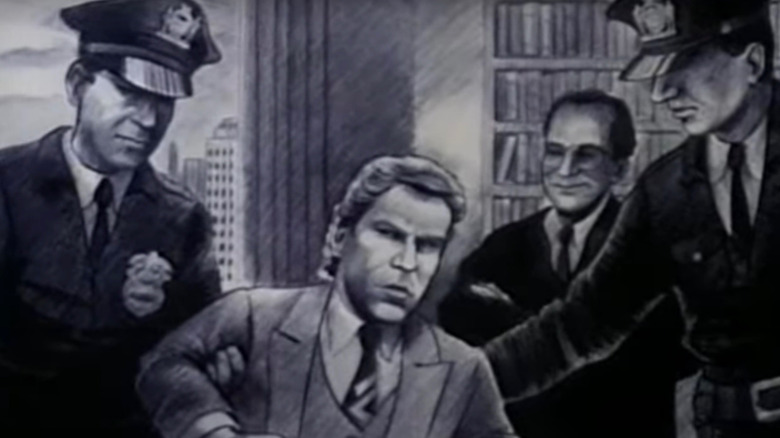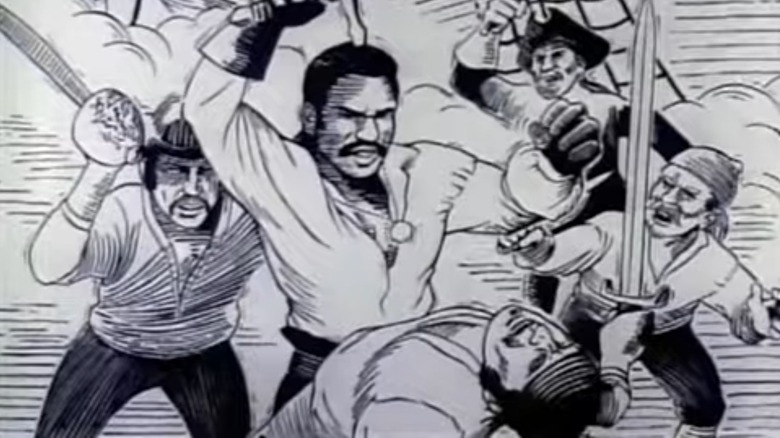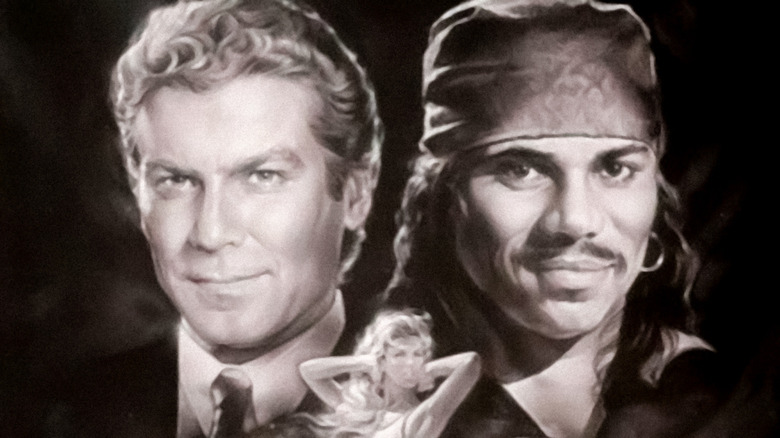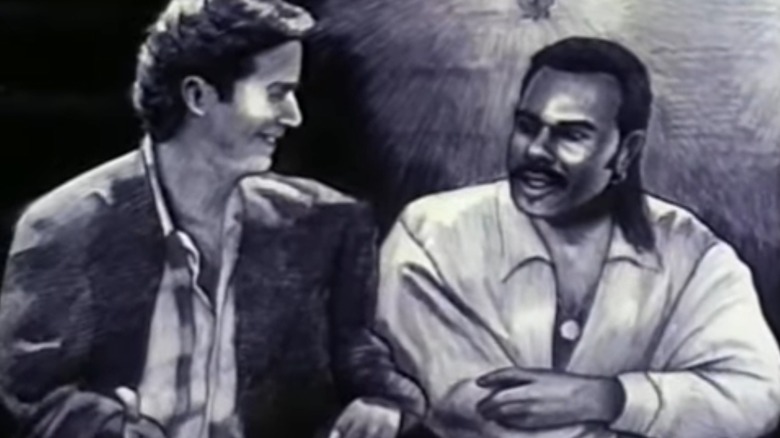Remembering The 100 Lives Of Black Jack Savage, The Most Bonkers TV Show Disney Ever Produced
The above image is of former Disney CEO Michael Eisner (who held the position from 1984 to 2005), and he is key to this story. Sit tight, and you'll soon see why.
When Disney+ launched in November of 2019, it was met — natch — with a firestorm of studio publicity. Disney possesses one of the most extensive back catalogs in film history, and, having just acquired the Fox catalog the previous March, it was looking like Disney+ could be the largest streaming repository for film and TV available on the market. Archivists and deep-cut Disney enthusiasts were dismayed, then, to see that Disney+ would launch with a relatively small handful of titles, numbering only 872. While 872 is surely a lot, and could keep one entertained for years, it was hardly a deep dive compared to what was available. The streaming service offered expected culprits — "The Avengers" movies, "The Simpsons," the "Star Wars" films, most of their animated feature films — but relatively few obscurities, apart from unbeloved films like "Jungle 2 Jungle," "Meet the Deedles," and "Fuzzbucket."
It was clear Disney was not constructing a massive archive, but once again playing the "Disney vault" game, offering only limited titles for a limited time as a way of manufacturing scarcity. Not-so-curiously, the service featured a good deal of the company's properties from the early-to-mid-1990s, perhaps a wise move as the people who were kids during those years would now be in a position to share those shows and movies with kids of their own.
Inconspicuously absent from Disney+ was one of the strangest shows the company ever put out, and from a studio that owns "The Gnome-Mobile," that's saying something. It's likely no one at Disney thought to look up the Stephen J. Cannell-created "The 100 Lives of Black Jack Savage," as it ran for only seven episodes from March to May of 1991, but one would think it would be worth a second look as — and there are recordings of this — Disney CEO Michael Eisner personally introduced the show.
The premise
The premise is an elevator pitch of epic proportions. The intro to the show was read thus:
"In 1650, Black Jack Savage, the famed Caribbean pirate, was captured and hanged in the castle where he lived on the island of San Pietro. 300 years later, Barry Tarberry, a Wall Street pirate indicted for stock fraud, skipped bail and took up residence in Black Jack's castle. Since the ghost only appears to the owner of the castle, an uneasy partnership was formed. For their crimes, Black Jack's spiritual guide Larry demands that they save 100 lives, or face an eternity in Hell."
The upbeat, steel drum-heavy theme song begins over footage of Black Jack Savage being hung, and — in a fit of good taste — the title appears over his dangling feet.
To elucidate: Jack Savage, being a pirate, had committed multiple murders in his life, and was now doomed to haunt his own castle until his soul could be purified. If Jack Savage steps outside of the castle, he will be beset by flying demons called Snarks. The design of the Snarks changed over the course of the series, but they initially looked like the back half of a cat, but with wings and bird talons. The Snarks could open up a portal to Hell and sought to shove Jack through it. The portal appeared in the nearest tree stump. Because Barry Tarberry was the only person who could see Jack, and because Jack was a ghost who couldn't touch anything, it was up to Barry to commit acts of righteousness in Jack's name. In one episode, Barry even dressed as Jack.
Thanks to a tech wizard who had been squatting in the castle's basement, Jack Savage (Stoney Jackson in the pilot, Steven Williams thereafter) and Barry (Daniel Hugh Kelly) had access to a high-tech, sci-fi super boat, called the Blackbird, which allowed them to scuttle around the island undetected. The boat once belonged to a drug kingpin. In one of his intros, Michael Eisner talked up how cool the Blackbird was. The island, San Pietro, was overseen by a "comedic" dictator named Abel Vasquez (Bert Rosario) with whom Barry was friendly. The island was also home to a freedom fighter named Danielle, played by Roma Downey. The tech wizard was played by Steve Hytner.
At the end of every episode, after Barry and Jack had saved someone, there was a recap as to how many souls Jack had left.
Trump as a character type in '90s media
It's worth mentioning that Barry Tarberry was, and is, a very clear analog for Donald Trump, who was seen as little more than a foolish, failed businessman in 1991. Many, many movies and TV shows in the '80s and '90s used Trump as a template for an "over-the-top, unduly confident, definitely corrupt, yuppie dillhole real estate guy" character. One of the running gags of "The 100 Lives of Black Jack Savage" is that the Donald Trump character, while forced into doing works of righteousness to redeem Jack's — and his own — soul, never seems to adopt any sort of moral ethos; he is perpetually selfish, rude, sexist, and awful. That he also pals around with a military dictator also serves as a predictor as to Trump's time as president, when he would regularly compliment and glibly dismiss dictators.
Charles Montgomery Burns from "The Simpsons," the evil Biff from "Back to the Future Part II," Daniel Clamp from "Gremlins 2: The New Batch," Gordon Gekko from "Wall Street," Max Schreck from "Batman Returns," Patrick Bateman from "American Psycho," Donald Grump on "Sesame Street," Hollis Doyle from "Scandal," M.O.D.A.A.K. from Marvel Comics, Ronaldo Rump from "Biker Mice from Mars," Victor Baron from "Castle," and perhaps even Scrooge McDuck from "DuckTales" were all modeled after Trump to one degree or another. He was an easy character type to imitate and his behavior was good shorthand for selfish villainy: You'll notice that, apart from Daniel Clamp and Scrooge, these characters are all villains. Trump was also a regular object of mockery in MAD Magazine. There was a time when he was less a pundit or a politician, and more an easy target.
If you ever wanted to see Donald Trump as the co-lead in a supernatural adventure show, "The 100 Lives of Black Jack Savage" provides.
Stephen J. Cannell
Just as baffling as Michael Eisner's open endorsement of "The 100 Lives of Black Jack Savage" — apart from its bizarre premise — is the involvement of TV titan Stephen J. Cannell. Cannell (1941 – 2010) was responsible for some of the most popular primetime adventure shows of the '70s and '80s, including "The Rockford Files," "The A-Team," "Hunter," "The Greatest American Hero," "Hardcastle and McCormick," "21 Jump Street," "The Commish," and the unforgettable UPN series "Marker."
Looking over Cannell's body of work, one can see a repeated notion emerge: Many of his shows are about ordinary characters — not predisposed to heroism — put in desperate or unusual circumstances where they are forced to commit acts of generosity and helpfulness. I guess it made sense that the ordinary character should be Donald Trump, right?
The bulk of Cannell's output involved cops or detectives, with only two of his shows involving supernatural element: This one and "The Greatest American Hero." A key component needed to make a supernatural program function is a set of easy-to-understand rules. A vampire series, for instance, needs to establish what a vampire can and cannot do, what it takes to kill them, etc., in order to form a basis for a story. "The 100 Lives of Black Jack Savage" has a pretty complicated set of rules which are explained ad nauseam throughout the show's seven episodes. Indeed, the premise itself is a Gordian mess, leading to constant extended explanations in the show's introductions. If one needs to take notes just to understand the underlying setup, perhaps the setup is too complicated.
Where to watch it
"The 100 Lives of Black Jack Savage" was originally broadcast on NBC and hasn't been seen since. There were no VHS or DVD releases of the show, and it's not available on any streaming services. Thanks to enterprising fans who captured it on their VCRs, much of the show can be found in bootleg form on YouTube. If the show is not available by any legitimate means, then a pirate becomes an archivist.
The unavailability of "Black Jack Savage" points to a larger problem in the streaming age, however: Studios' have an utter lack of interest in building a complete, permanent archive of their own work available to the public. A streaming service is not a library, but a boutique outlet store with only a few products available in the front, and a locked warehouse several blocks away. Most streaming services, in competing for eyes and dollars, pull viewers in with original content left conveniently on their front pages, hoping you'll watch that instead of delving into their surprisingly shallow film collections. Only specially curated services like Shudder, Ovid, or The Criterion Channel are going to warrant fascinating discoveries via browsing. It's likely not economically or technologically feasible to leave open a library of hundreds of thousands of titles ready for perusal ... but that's what I want.
One shouldn't forget that streaming services are only held to the caprices of the corporate machine, and devotion to maintaining some of the more bizarre dark corners of pop culture — and it doesn't get too much more bizarre than "The 100 Lives of Black Jack Savage" — is not of grave concern to them. Your "recommended" watchlist is based on an algorithm that will, eventually, push the hot new show to you, and will not have the wherewithal to think, "This one is weird, no one liked it, but it's fascinating and maybe you should check it out." Algorithms push out the weird, the failed, and the outré. They discourage discovery and are designed to obfuscate the existence of bonkers experiments that have long gone forgotten.
To spite the cyber-mind, watch "The 100 Lives of Black Jack Savage" today.



